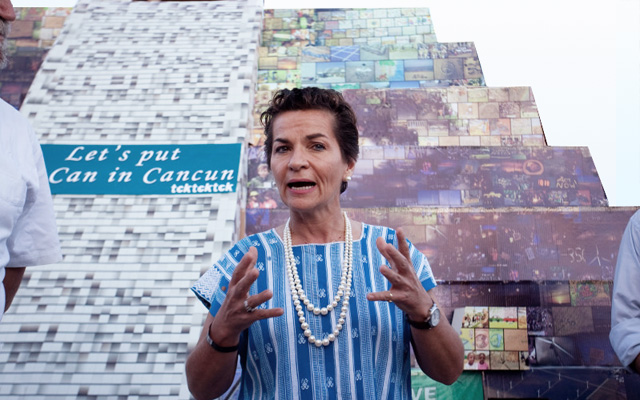Delegates arriving this week for the Cancun climate summit were greeted by the tcktcktck "Pyramid of Hope" which served as a reminder that the long and arduous task of constructing a global climate change regime is perhaps not unlike the building of great temples, cathedrals and mosques in the past.
These marvels of human ingenuity and dedication took decades to complete. Their realisation, block by block, required three elements -- the visionaries who believed in creating something to benefit those born long after them; the dedication of thousands of skilled technicians and workers; and, crucially, politicians prepared to provide a steady supply of funds.
Often, the main building work was interrupted for one reason or another, and dedicated craftsmen continued to chisel away at individual pieces until works resumed. That is probably where we are right now with the international climate change treaty -- except of course that we don't have the luxury of infinite time.

It is true that ambitions for achieving a legally binding climate agreement have been tempered this year. As countries worked to re-establish an atmosphere of trust and momentum in the aftermath of last year's summit in Copenhagen, the US backed itself into a corner.
After failing to pass critical climate and energy legislation, the midterm elections saw the balance of power in Congress shift towards a more climate skeptical stance. In the back of everyone's minds is the unassailable fact that the US will not be in a position to ratify a climate treaty anytime soon.
But does this mean that other countries should stop working towards that goal? No, because we still need that legally binding agreement. Many argued that Copenhagen was potentially our last chance to avert catastrophic climate change. And while climate deniers crowed that the deadline came and went without the world coming to an end, they missed the point.
Imagine an asteroid hurtling towards Earth with a collision expected in 20 years time. Early intervention would require us to alter its trajectory by only a small amount to prevent the collision. The longer we waited the greater that intervention would need to be. The same is true for climate change: we still have time to alter course, but the longer we wait the harder and costlier it will become, and there will come a point when staving off catastrophe is no longer even possible.
Chiselling away at the building blocks
Fortunately, governments, businesses and ordinary people are already taking action even in advance of finalizing a global agreement. And while a final agreement is not expected in Cancun, there are many things we can achieve there: the individual building blocks which bring us much closer to finalizing a comprehensive pact, possibly in South Africa next year. Some are tangible, some have more to do with tone and symbol. All are needed to breathe life back into the ultimate quest for a fair, ambitious and binding treaty.
The recent UN Biodiversity summit in Japan (PDF) demonstrated that international negotiations can still succeed in bringing countries with hugely diverse national interests to agreement on common actions for the common good. In Nagoya, delegates listened to the advice of scientists, increased their ambition levels, found additional funding and made compromises to reach agreements.
Maybe they didn't save the planet from one day to the next, but there is now -- for example -- a biodiversity rescue plan to boost the area of protected land in the world to 17 percent and to turn 10 percent of our oceans into marine protected areas by 2020. It is too early to say whether this meeting was a turning point for the UN, but it was certainly inspiring enough to help boost morale.
In that same spirit, parties in Cancun can begin to demonstrate that national self-interest is actually best served by international cooperation, rather than short-sighted and narrow-minded bickering. We will need many hands joining together to master this monumental task, and like those who built the temples and cathedrals of the past we all need to be guided by the same plan and a shared vision.
